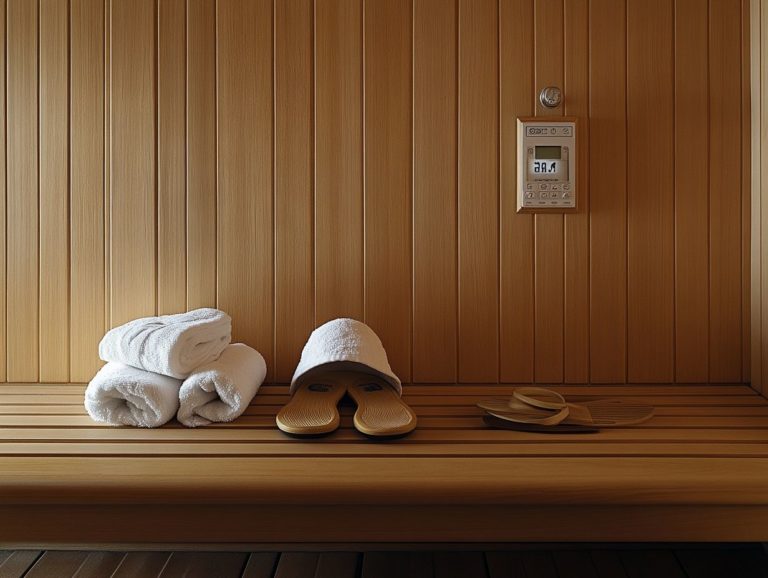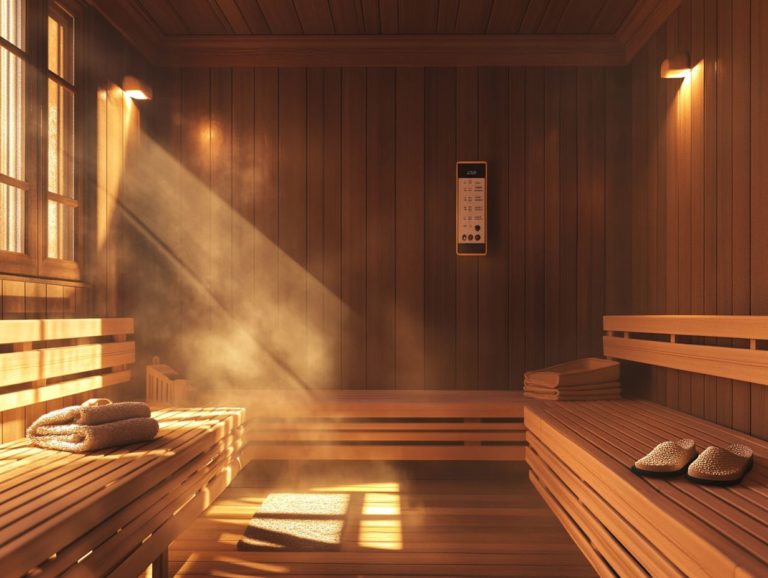Sauna Safety: A Path to Better Health
Saunas, including traditional and modern infrared saunas, are revered for their calming warmth and numerous health benefits.
In this exploration, you ll uncover what a sauna truly is and the physical and mental health advantages it provides. While enjoying a sauna can be immensely rewarding, it’s essential to be aware of the precautions and potential health risks involved.
By following essential safety measures and practical tips, you can ensure your sauna experience is both safe and revitalizing.
Want to boost your health? A sauna can do just that! Jump in now to unlock the amazing benefits of sauna!
Contents
- Key Takeaways:
- Benefits of Sauna Use
- Precautions for Sauna Use
- Potential Risks of Sauna Use
- How to Use a Sauna Safely
- Frequently Asked Questions
- What is a sauna and how can it improve my health?
- Is it safe to use a sauna regularly?
- Are there any health conditions that may prevent me from using a sauna?
- What are some key safety tips to keep in mind when using a sauna?
- Can children use a sauna?
- Are there any potential risks associated with using a sauna?
Key Takeaways:
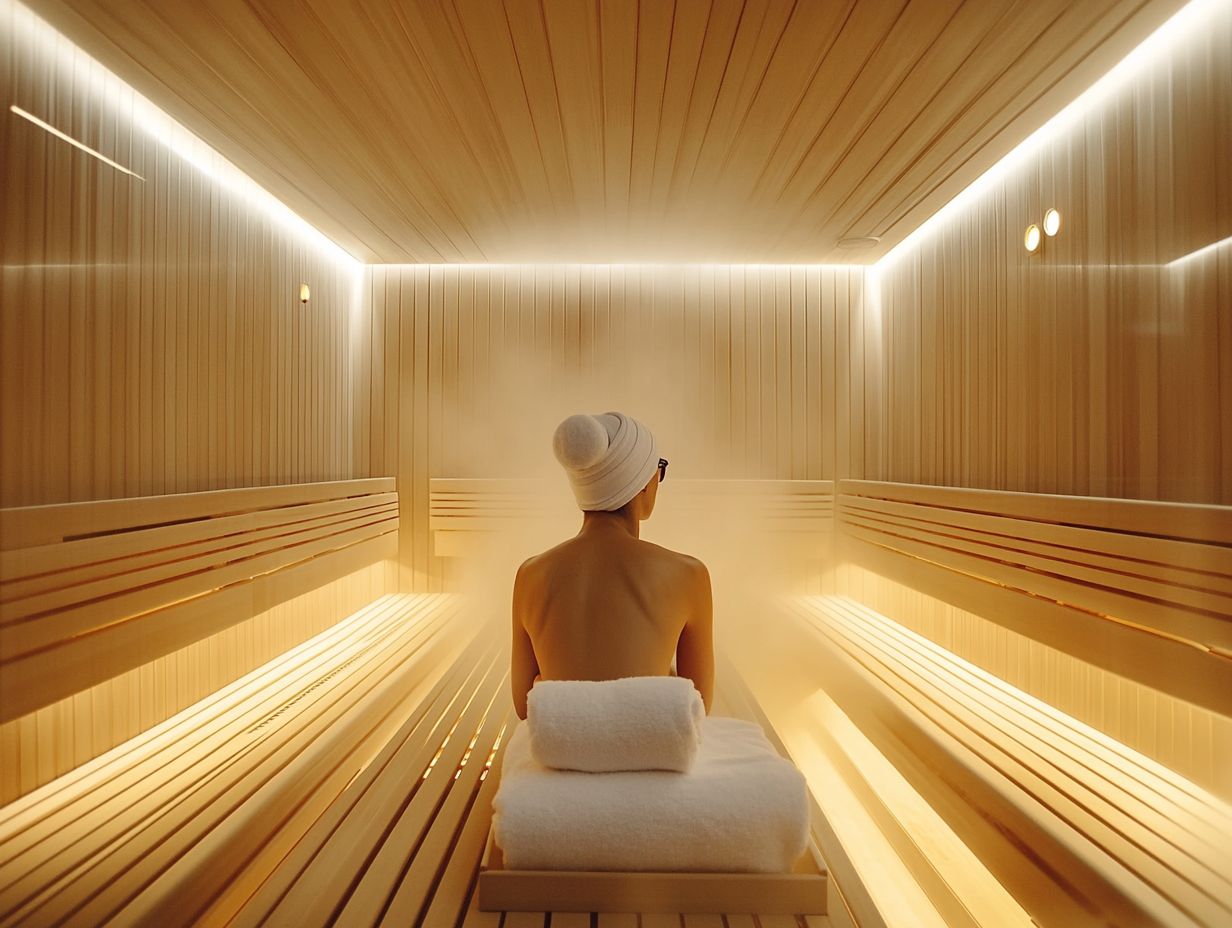
- Regular sauna use provides physical and mental health benefits, such as relaxation and improved circulation.
- To ensure a safe sauna experience, take precautions like staying hydrated and limiting time in the sauna, especially if you have health conditions like high blood pressure or asthma.
- Saunas may pose health risks if not used properly, but these risks can be minimized by following safety measures and using saunas in moderation.
What is a Sauna?
A sauna is more than just a small room; it s your personal retreat for enjoying dry or wet heat sessions, perfect for relaxation and various health benefits.
The history of saunas is captivating, rooted in ancient cultures that recognized the profound effects of heat on both physical and mental well-being. Traditional saunas, particularly those in Finnish culture, are typically made from wood and heated by stove systems. They create a warm oasis for unwinding.
Then there are infrared saunas, which offer a modern twist. They utilize infrared light to provide gentle warmth that penetrates deeper into your skin, making them popular for body cleansing and pain relief.
Steam rooms also enhance the sauna experience, showcasing high humidity and heated water vapor that can improve respiratory health and promote skin cleansing. Each sauna type, with its unique design and benefits, contributes significantly to a holistic approach to health and relaxation, making them increasingly sought after in w wellness routines worldwide.
Benefits of Sauna Use
Using a sauna offers numerous health benefits that enhance both your physical and mental well-being, making it an appealing option for anyone seeking relaxation and improved health.
Research shows that regular sauna sessions can enhance your heart health by lowering blood pressure and reducing the risk of heart disease. Heat exposure in saunas helps with detoxifying your body, alleviating inflammation, and offering significant pain relief for conditions like fibromyalgia and rheumatoid arthritis.
These benefits lead to a noticeable improvement in your overall quality of life.
Physical and Mental Health Benefits
Regular sauna sessions can provide a treasure trove of physical and mental health benefits. You’ll find stress relief and muscle recovery essential for maintaining an active lifestyle.
The sauna’s heat encourages sweating, aiding in detoxifying your body while also enhancing hydration and improving skin conditions. In this warm setting, your relaxation response activates, promoting anxiety relief and transforming the sauna into a holistic tool for enhancing overall well-being.
Frequent sauna use significantly boosts circulation, delivering nutrients to your muscles and facilitating quicker recovery after intense workouts. As an athlete or fitness enthusiast, you may find that incorporating sauna sessions into your routine not only relieves soreness but also revitalizes your skin, giving you a healthy glow.
On a mental level, stepping into a sauna creates a sanctuary away from daily stressors, encouraging mindfulness and providing a much-needed escape from life s hustle and bustle. This unique blend of physical rejuvenation and mental clarity makes sauna use an invaluable asset for your overall wellness.
Precautions for Sauna Use

Sauna use offers health benefits, but following precautions is essential for your safety. Always consult your healthcare provider, especially if you have pre-existing conditions like hypertension, respiratory issues, or if you’re pregnant.
Knowing sauna etiquette and recognizing the signs of dehydration can enhance your experience while protecting your well-being.
Important Safety Measures
To enjoy a safe sauna experience, follow essential safety measures. Drink plenty of water before and after your visit.
Always listen to your body. If you feel any discomfort, exit the sauna immediately.
Mindful etiquette is key. Shower before entering and use a towel for hygiene.
If you have health concerns, consult your healthcare provider for tailored recommendations.
Potential Risks of Sauna Use
While sauna use is generally safe, stay informed about potential health risks, especially if you have conditions like high blood pressure or heart-related issues.
Overheating and prolonged exposure can lead to dehydration, worsening existing health issues. Recognizing your personal limits is vital for a safe experience.
Health Risks and How to Avoid Them
Being aware of health risks associated with sauna use, such as dehydration and elevated heart rates, is essential for safety. To avoid these risks, follow recommended precautions, including limiting your stay and staying well-hydrated.
High temperatures can cause significant fluid loss through sweat, increasing the risk of dehydration. Early signs include dizziness, fatigue, or headaches.
Stay hydrated! Drink plenty of water before, during, and after your sauna session. Take breaks to cool down and monitor how your body responds. If you have heart health concerns or other medical issues, talk to a healthcare professional.
How to Use a Sauna Safely
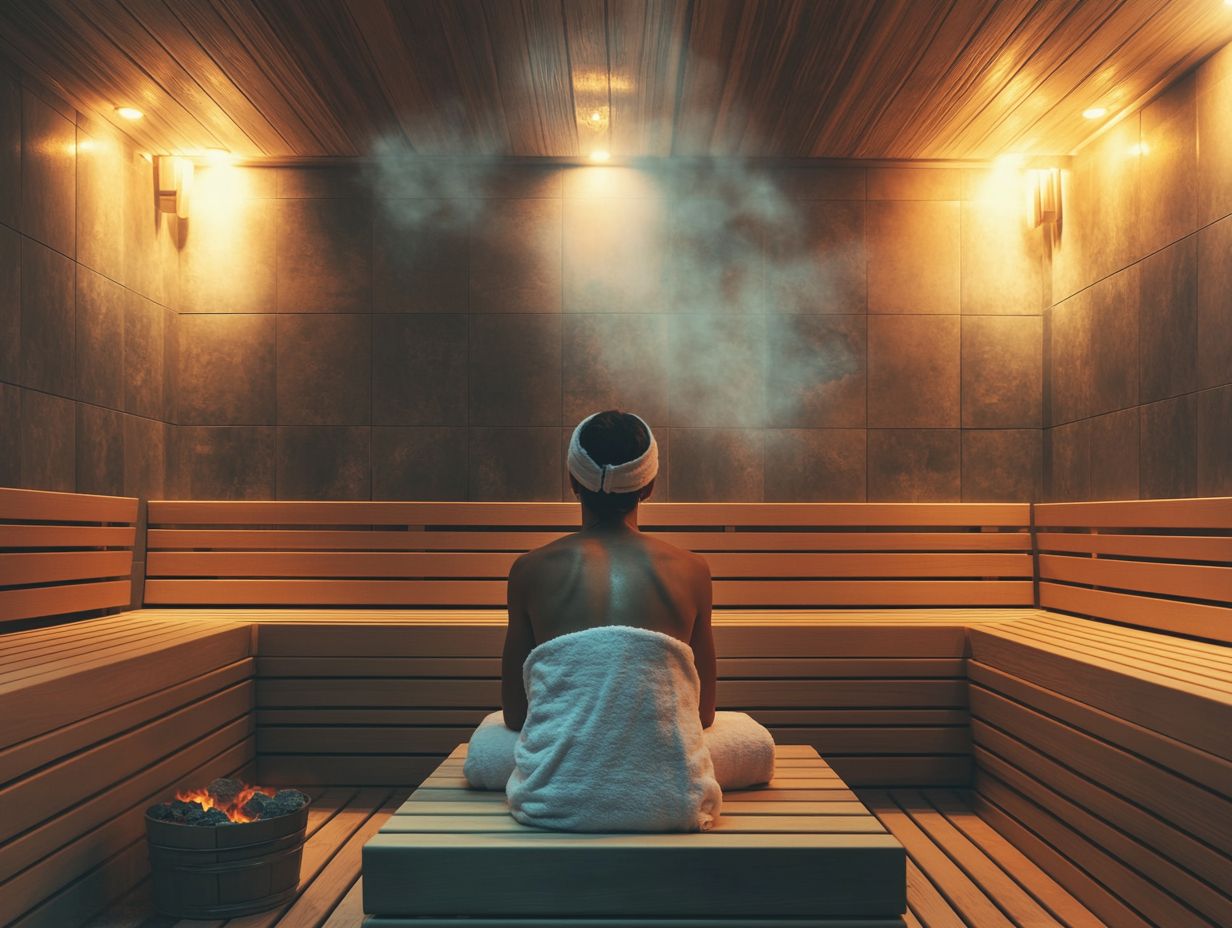
To maximize your sauna experience while prioritizing safety, follow key guidelines for your sessions.
Adjust the temperature to suit your comfort level. Consider using towels to enhance your experience.
Limit each session’s duration and take breaks to prevent overheating while enjoying your time in the heat.
Tips for Safe and Enjoyable Sauna Sessions
For safe and enjoyable sauna sessions, it s essential to stay properly hydrated, keep the sauna at a comfortable heat level, and follow sauna etiquette. Drinking water before and after each session helps prevent dehydration, while being mindful of your comfort regarding heat levels is crucial for both safety and enjoyment.
Respecting the space and privacy of others enhances the social aspect of sauna use. To improve your sauna experience, consider bringing a reusable water bottle to sip on throughout your time inside. Start with lower temperature settings to allow your body to acclimate to the heat gradually, ensuring you don t overheat right away.
Maintaining the sauna’s tranquil ambiance by keeping conversations to a minimum can create a more relaxing environment for everyone involved. If you re new to sauna use, remember to take breaks and listen to your body. Stepping outside for some cool air not only refreshes you but also promotes overall wellbeing.
By integrating these practices, you’ll absolutely enjoy the myriad health benefits that saunas offer while prioritizing your safety. Start your sauna journey safely today!
Frequently Asked Questions
What is a sauna and how can it improve my health?
A sauna is a small room or space that is heated to high temperatures with low humidity. It is typically used for relaxation and sweating, which can have various health benefits such as improving circulation, relieving muscle soreness, and detoxifying the body.
Is it safe to use a sauna regularly?
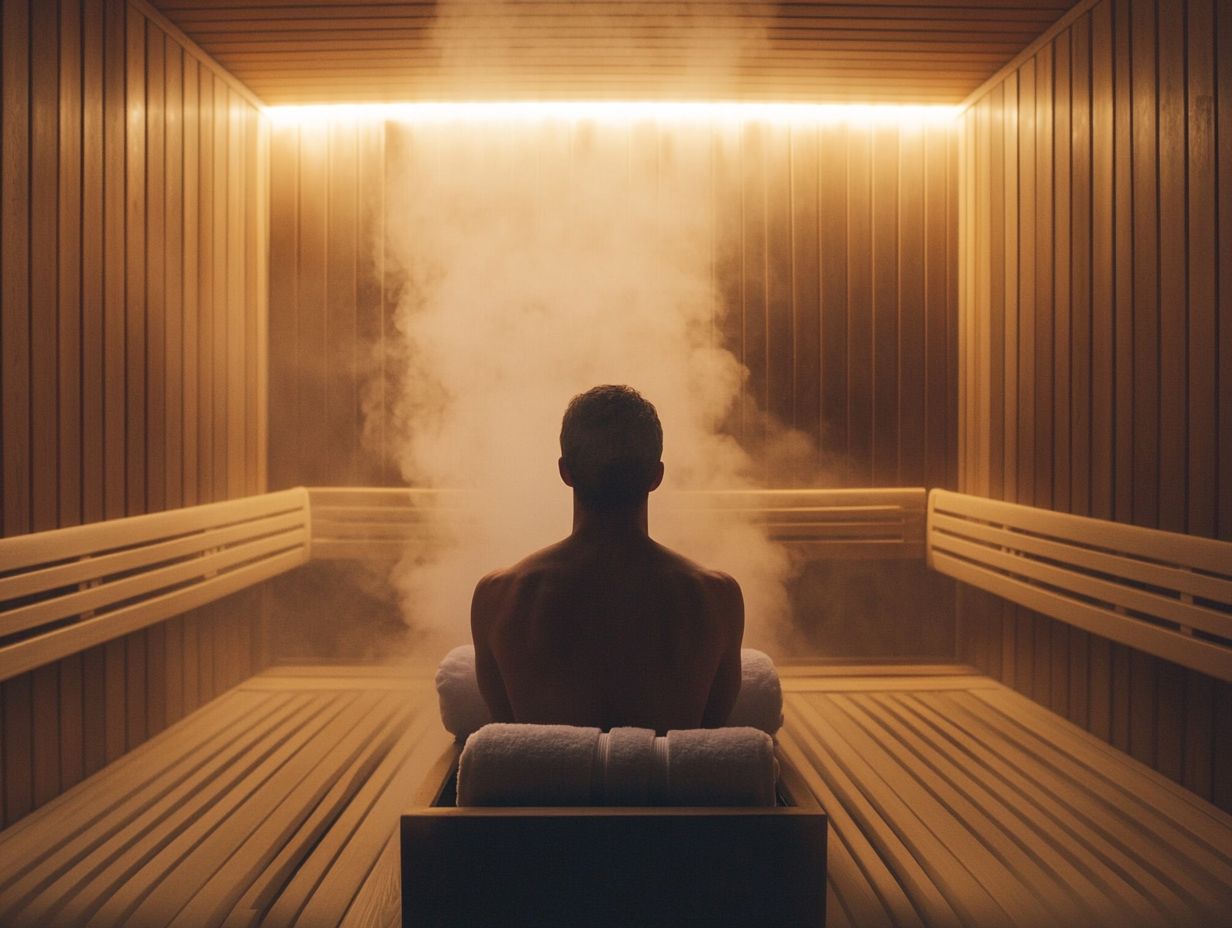
Yes, when used properly, saunas are generally safe for most people. However, it is important to follow safety precautions and listen to your body’s signals to avoid any potential risks.
Are there any health conditions that may prevent me from using a sauna?
Yes, individuals with certain health conditions such as low blood pressure, heart disease, and pregnancy should consult their doctor before using a sauna. People with sensitive skin or respiratory issues should also use caution. Conditions like hypertension, asthma, and cardiovascular disease may require medical advice before sauna sessions, especially considering the effects on blood vessel function and oxidative stress.
What are some key safety tips to keep in mind when using a sauna?
- Always stay hydrated.
- Limit your time in the sauna to 15-20 minutes.
- Avoid using a sauna if you are feeling unwell.
- Properly cool down and rest after using a sauna.
- Practice sauna etiquette.
- Understand sauna safety to mitigate health risks associated with dehydration and overheating, ensuring your nervous system and cardiovascular health remain protected.
Can children use a sauna?
Children should not use a sauna without adult supervision. They should only stay in the sauna for a short time. Always consult a pediatrician before allowing children to use a sauna, especially to discuss any health conditions or risks, such as losing too much water and getting too hot.
Are there any potential risks associated with using a sauna?
While saunas are generally safe, some risks exist. These include losing too much water, getting too hot, and skin irritation.
It’s crucial to use the sauna wisely to stay safe. Listen to your body s signals to avoid potential problems. People with certain skin conditions, like psoriasis, may experience inflammation or irritation, so they should be cautious, especially in the high temperatures of traditional or infrared saunas.


